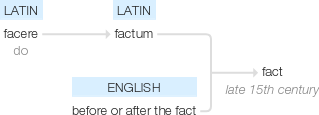Fact
late 15th century: from Latin factum, neuter past participle of facere ‘do’. The original sense was ‘an act’, later ‘a crime’, surviving in the phrase before (or after) the fact . The earliest of the current senses (‘truth, reality’) dates from the late 16th century.
wiktionary
From Old French fact, from Latin factum(“an act, deed, feat, etc.”); also Medieval Latin for "state, condition, circumstance"; neuter of factus(“done or made”), perfect passive participle of faciō(“do, make”). Old/Middle French later evolved it into faict and fait. Doublet of feat.
etymonline
fact (n.)
1530s, "action, anything done," especially "evil deed," from Latin factum "an event, occurrence, deed, achievement," in Medieval Latin also "state, condition, circumstance," literally "thing done" (source also of Old French fait, Spanish hecho, Italian fatto), noun use of neuter of factus, past participle of facere "to do" (from PIE root *dhe- "to set, put"). Main modern sense of "thing known to be true" is from 1630s, from notion of "something that has actually occurred."
Compare feat, which is an earlier adoption of the same word via French. Facts "real state of things (as distinguished from a statement of belief)" is from 1630s. In fact "in reality" is from 1707. Facts of life "harsh realities" is from 1854; euphemistic sense of "human sexual functions" first recorded 1913. Alliterative pairing of facts and figures is from 1727.
Facts and Figures are the most stubborn Evidences; they neither yield to the most persuasive Eloquence, nor bend to the most imperious Authority. [Abel Boyer, "The Political State of Great Britain," 1727]
